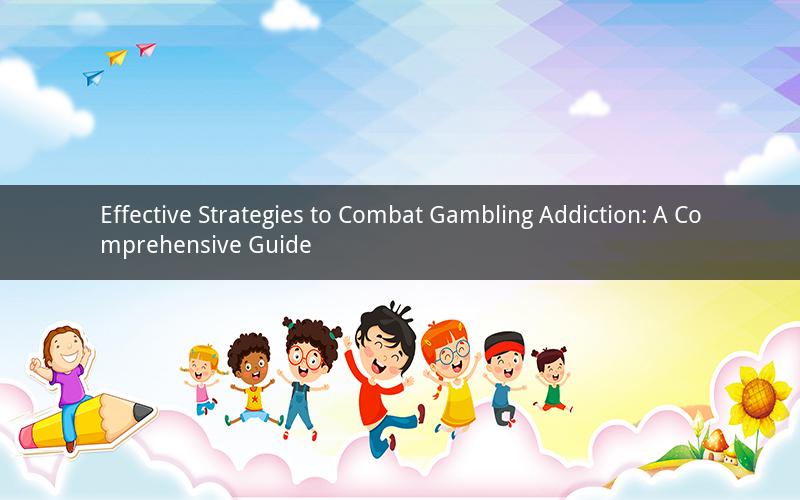
Gambling addiction is a significant issue that affects millions of individuals worldwide. It is characterized by an uncontrollable urge to gamble, despite the negative consequences it may have on one's life. If you or someone you know is struggling with gambling addiction, it is crucial to seek help and implement effective strategies to overcome this challenge. This article provides a comprehensive guide on how to stop gambling addiction, offering practical tips and insights to help you on your journey to recovery.
1. Understand the nature of gambling addiction
To effectively combat gambling addiction, it is essential to understand its nature. Gambling addiction is a behavioral disorder that affects the brain's reward system, leading to cravings and a sense of euphoria. It is not a moral failing but a complex condition that requires professional intervention and support.
2. Seek professional help
Seeking professional help is the first step in overcoming gambling addiction. A therapist or counselor can provide personalized guidance and support tailored to your specific needs. They can help you identify the underlying causes of your addiction and develop a tailored treatment plan.
3. Build a support network
A strong support network is crucial in overcoming gambling addiction. Surround yourself with individuals who are supportive and understanding of your struggle. This may include family members, friends, or support groups dedicated to helping individuals with gambling addiction.
4. Identify and avoid triggers
Identifying and avoiding triggers is an essential part of overcoming gambling addiction. Triggers can be anything that reminds you of gambling, such as visiting casinos, watching gambling-related shows, or being around individuals who gamble. By avoiding these triggers, you can reduce the likelihood of relapse.
5. Develop healthy coping mechanisms
Developing healthy coping mechanisms is crucial in overcoming gambling addiction. Engage in activities that provide a sense of fulfillment and distraction from the urge to gamble. This may include exercise, hobbies, or spending time with loved ones. By finding alternative ways to cope with stress and boredom, you can reduce the temptation to gamble.
6. Create a budget and stick to it
Creating a budget and sticking to it is an effective way to manage your finances and reduce the temptation to gamble. Track your spending and set strict limits on how much you can afford to lose. Avoid using credit cards or loans to fund your gambling habits, as this can lead to further financial distress.
7. Practice self-discipline
Practicing self-discipline is essential in overcoming gambling addiction. Develop a strong sense of self-control and commit to avoiding gambling situations. This may involve removing access to gambling websites, deleting gambling apps, and avoiding places where you are likely to be tempted to gamble.
8. Set realistic goals
Setting realistic goals is crucial in maintaining long-term recovery from gambling addiction. Start with small, achievable goals and gradually increase the difficulty as you progress. Celebrate your successes along the way to stay motivated and focused on your journey to recovery.
9. Monitor your progress
Monitoring your progress is essential in overcoming gambling addiction. Keep a journal to track your thoughts, feelings, and behaviors related to gambling. Reflect on your progress regularly and adjust your treatment plan as needed. Remember that recovery is a continuous process, and setbacks are a natural part of the journey.
10. Stay committed to your recovery
Staying committed to your recovery is the key to overcoming gambling addiction. Remember that recovery is a lifelong process, and it is essential to remain vigilant and proactive in maintaining your progress. Seek support when needed and be patient with yourself as you navigate the challenges of recovery.
Questions and Answers:
1. What are some common signs of gambling addiction?
Answer: Common signs of gambling addiction include a preoccupation with gambling, a need to increase the stakes to achieve the same level of excitement, lying to hide gambling habits, and experiencing financial, emotional, or legal problems due to gambling.
2. Can therapy help with gambling addiction?
Answer: Yes, therapy can be highly effective in treating gambling addiction. Therapists can help individuals identify the underlying causes of their addiction, develop coping strategies, and provide support throughout the recovery process.
3. How can I avoid relapse after overcoming gambling addiction?
Answer: To avoid relapse, it is essential to maintain a strong support network, identify and avoid triggers, develop healthy coping mechanisms, and stay committed to your recovery. Regularly monitor your progress and seek support when needed.
4. Is it possible to recover from gambling addiction on my own?
Answer: While it is possible to recover from gambling addiction on your own, seeking professional help and joining support groups can significantly increase your chances of long-term recovery. Professional intervention can provide personalized guidance and support tailored to your specific needs.
5. How long does it take to recover from gambling addiction?
Answer: The duration of recovery from gambling addiction varies from person to person. Some individuals may experience immediate relief, while others may require ongoing treatment and support for several years. Recovery is a continuous process, and it is essential to remain patient and committed to your journey.